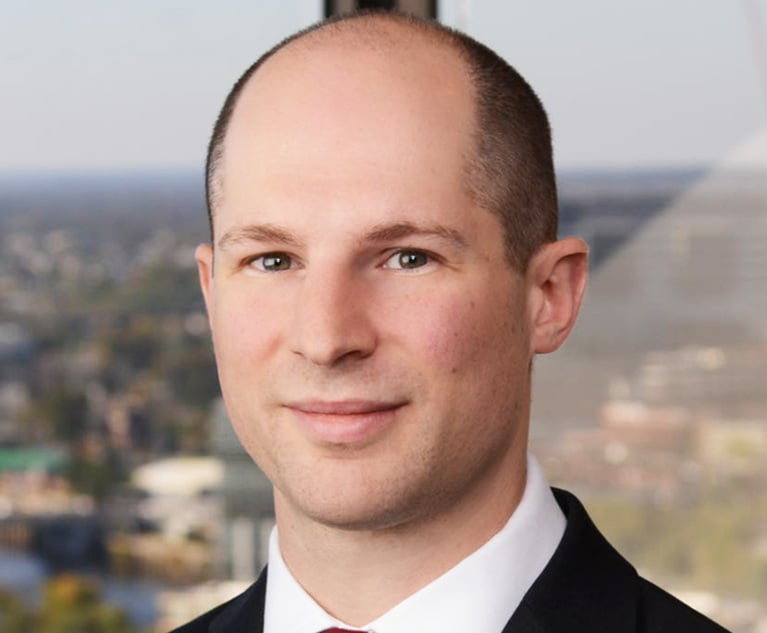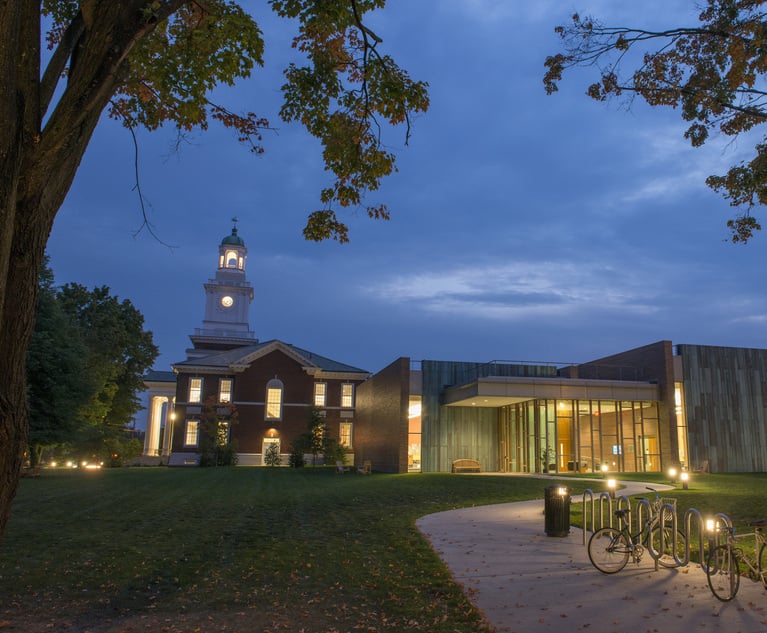 The Supreme Court Chamber in the Pennsylvania State Capitol building in Harrisburg, Pennsylvania. (Photo: Shutterstock)
The Supreme Court Chamber in the Pennsylvania State Capitol building in Harrisburg, Pennsylvania. (Photo: Shutterstock)From Excessive Force to Airbnb Rentals, Pa. Justices Already Have Full Plate for 2019
Throughout 2018, the Pennsylvania Supreme Court amassed a long and eclectic list of allocatur grants on issues that will likely be decided in the coming year.
December 27, 2018 at 01:42 PM
6 minute read
Throughout 2018, the Pennsylvania Supreme Court amassed a long and eclectic list of allocatur grants on issues that will likely be decided in the coming year.
As of press time, the court had not yet ruled on a host of topics pending before them, ranging from the scope of police officers' liability in excessive-force cases to schools' duty to protect student-athletes to zoning restrictions on Airbnb-style rentals, among others.
Here are some of the biggest cases to look out for in 2019:
|Excessive Force?
Is a State Police trooper acting within the scope of his employment immune from excessive-force claims, even if his actions cause intentional harm? That is a question the justices are expected to answer in the case Justice v. Lombardo.
The case stems from an altercation between trooper Joseph Lombardo and plaintiff Shiretta Justice that occurred after a traffic stop. Last year, a three-judge Commonwealth Court panel found that, because Lombardo had been acting within the scope of his employment and had been authorized in his behavior, he was protected by sovereign immunity, and the details of the incident involving Justice were “irrelevant.”
“Whether his conduct was reasonable or not, intentional or not, tortious or not, carried out for an improper motive or not, are all irrelevant because Trooper Lombardo's use of force in placing Ms. Justice's hands behind her back and 'wrestling' with her to apply handcuffs was of the same general nature as that authorized or incidental to the conduct authorized, and use of force, in general, by state troopers is not unexpected,” Senior Judge Dan Pellegrini wrote for the court.
The justices granted allocatur in a one-page order issued June 5, taking up a single question: “Was [respondent] acting within the scope of his employment throughout his entire encounter with the motorist, and thus entitled to JNOV on the basis of sovereign immunity?”
They heard arguments in the case in early December.
|Zoning in the Gig Economy
Also in the December, the justices heard arguments in a case that could have broad implications for residents seeking to rent out their homes on Airbnb and other lodging networks that have proliferated in the so-called gig economy. In the case Slice of Life v. Hamilton Township Zoning Hearing Board, the justices agreed to specifically address whether a zoning board can penalize a property owner for operating a single-family home as a short-term vacation rental.
The case involves property owner Val Kleyman and her company, Slice of Life, which operated the home as a vacation rental. After the township argued that the use was at odds with the zoning, the trial court held that Kleyman's use of the property as a short-term rental created public health and safety concerns, specifically regarding the untested septic system on the property. A Commonwealth Court panel, however, disagreed, finding the board offered only speculation.
The justices granted allocatur to determine “whether the Commonwealth Court disregarded the binding precedent of this court, set forth in the case Albert v. Zoning Hearing Board of North Abington Township by finding that the purely transient use of a property as part of a commercial short-term vacation rental business was a permitted use in a residential zoning district?”
|Schools' Duty to Student-Athletes
December also saw the Supreme Court consider arguments over what standards colleges need to adhere to in order to satisfy their duty of care to student-athletes.
In the case Feleccia v. Lackawanna College the parties addressed whether colleges are “required to have qualified medical personnel present at intercollegiate athletic events to satisfy a duty of care to the college's student-athletes,” and whether clauses releasing schools from “any and all liability” in connection with intercollegiate football is enforceable when it comes to negligence claims.
The case stems from injuries two students sustained in 2010 while performing a variation of the “Oklahoma drill” during tryouts for Lackawanna College's football team. The students sued members of the team's medical staff, who were allegedly not certified or licensed to serve as athletic trainers.
A unanimous two-judge Superior Court panel held in February that a genuine issue of material fact existed regarding the players' assumption of risk during a tackle drill rather than during a football game. The decision reversed the trial court's grant of summary judgment to Lackawanna College and remanded the case for trial.
Arguments in the case came as sports-related litigation is growing around the country.
|Fracking and the Rule of Capture
In November, the Supreme Court agreed to hear arguments over whether the rule of capture, which precludes trespass liability for drillers where oil and gas drains from surrounding lands in the course of conventional extraction from an underground pool, applies where shale gas is extracted through hydraulic fracturing.
In an apparent case of first impression, the Pennsylvania Superior Court ruled earlier this year that it does not.
On Nov. 20, the high court issued a one-page order agreeing to consider a single question on appeal: “Does the rule of capture apply to oil and gas produced from wells that were completed using hydraulic fracturing and preclude trespass liability for allegedly draining oil or gas from under nearby property, where the well is drilled solely on and beneath the driller's own property and the hydraulic fracturing fluids are injected solely on or beneath the driller's own property?”
The case has drawn heavy amicus interest from industry organizations including the Marcellus Shale Coalition, the American Exploration & Production Council, the Pennsylvania Chamber of Business and Industry, the Pennsylvania Independent Oil and Gas Association, the Independent Petroleum Association of America and the American Petroleum Institute.
In a published opinion issued April 2 in Briggs v. Southwestern Energy Production, a two-judge panel of the Superior Court reversed a Susquehanna County trial judge's decision granting summary judgment to defendant Southwestern Energy Production Co. on claims of trespass and conversion by a group of property owners.
|'Birchfield' Retroactivity
In July, the state high court granted allocatur in a DUI case to tackle a single, seemingly straightforward question with potentially huge implications: “Should Birchfield v. North Dakota apply to all cases not yet final when the decision was rendered?”
The justices agreed to take up the case in a one-page order issued July 24 in Commonwealth v. Hays. The court is now set to decide whether DUI defendants are entitled to relief under the U.S. Supreme Court's 2016 decision in Birchfield, which barred criminal penalties for refusing to submit to a warrantless blood draw, even if they previously failed to challenge the blood draw, so long as their cases were still ongoing at the time Birchfield came down.
In Birchfield, the U.S. Supreme Court held in June 2016 that warrantless blood tests taken pursuant to implied consent laws are an unconstitutional invasion of privacy. The Birchfield court said, “Motorists cannot be deemed to have consented to submit to a blood test on pain of committing a criminal offense.”
This content has been archived. It is available through our partners, LexisNexis® and Bloomberg Law.
To view this content, please continue to their sites.
Not a Lexis Subscriber?
Subscribe Now
Not a Bloomberg Law Subscriber?
Subscribe Now
NOT FOR REPRINT
© 2024 ALM Global, LLC, All Rights Reserved. Request academic re-use from www.copyright.com. All other uses, submit a request to [email protected]. For more information visit Asset & Logo Licensing.
You Might Like
View All
While Data Breaches May Lead to Years of Legal Battles, Cyberattacks Can Be Prevented
4 minute read
The Growing PFAS Morass: Why Insurance Should Cover These Products Liability Claims
9 minute read
Trending Stories
Who Got The Work
Michael G. Bongiorno, Andrew Scott Dulberg and Elizabeth E. Driscoll from Wilmer Cutler Pickering Hale and Dorr have stepped in to represent Symbotic Inc., an A.I.-enabled technology platform that focuses on increasing supply chain efficiency, and other defendants in a pending shareholder derivative lawsuit. The case, filed Oct. 2 in Massachusetts District Court by the Brown Law Firm on behalf of Stephen Austen, accuses certain officers and directors of misleading investors in regard to Symbotic's potential for margin growth by failing to disclose that the company was not equipped to timely deploy its systems or manage expenses through project delays. The case, assigned to U.S. District Judge Nathaniel M. Gorton, is 1:24-cv-12522, Austen v. Cohen et al.
Who Got The Work
Edmund Polubinski and Marie Killmond of Davis Polk & Wardwell have entered appearances for data platform software development company MongoDB and other defendants in a pending shareholder derivative lawsuit. The action, filed Oct. 7 in New York Southern District Court by the Brown Law Firm, accuses the company's directors and/or officers of falsely expressing confidence in the company’s restructuring of its sales incentive plan and downplaying the severity of decreases in its upfront commitments. The case is 1:24-cv-07594, Roy v. Ittycheria et al.
Who Got The Work
Amy O. Bruchs and Kurt F. Ellison of Michael Best & Friedrich have entered appearances for Epic Systems Corp. in a pending employment discrimination lawsuit. The suit was filed Sept. 7 in Wisconsin Western District Court by Levine Eisberner LLC and Siri & Glimstad on behalf of a project manager who claims that he was wrongfully terminated after applying for a religious exemption to the defendant's COVID-19 vaccine mandate. The case, assigned to U.S. Magistrate Judge Anita Marie Boor, is 3:24-cv-00630, Secker, Nathan v. Epic Systems Corporation.
Who Got The Work
David X. Sullivan, Thomas J. Finn and Gregory A. Hall from McCarter & English have entered appearances for Sunrun Installation Services in a pending civil rights lawsuit. The complaint was filed Sept. 4 in Connecticut District Court by attorney Robert M. Berke on behalf of former employee George Edward Steins, who was arrested and charged with employing an unregistered home improvement salesperson. The complaint alleges that had Sunrun informed the Connecticut Department of Consumer Protection that the plaintiff's employment had ended in 2017 and that he no longer held Sunrun's home improvement contractor license, he would not have been hit with charges, which were dismissed in May 2024. The case, assigned to U.S. District Judge Jeffrey A. Meyer, is 3:24-cv-01423, Steins v. Sunrun, Inc. et al.
Who Got The Work
Greenberg Traurig shareholder Joshua L. Raskin has entered an appearance for boohoo.com UK Ltd. in a pending patent infringement lawsuit. The suit, filed Sept. 3 in Texas Eastern District Court by Rozier Hardt McDonough on behalf of Alto Dynamics, asserts five patents related to an online shopping platform. The case, assigned to U.S. District Judge Rodney Gilstrap, is 2:24-cv-00719, Alto Dynamics, LLC v. boohoo.com UK Limited.
Featured Firms
Law Offices of Gary Martin Hays & Associates, P.C.
(470) 294-1674
Law Offices of Mark E. Salomone
(857) 444-6468
Smith & Hassler
(713) 739-1250






